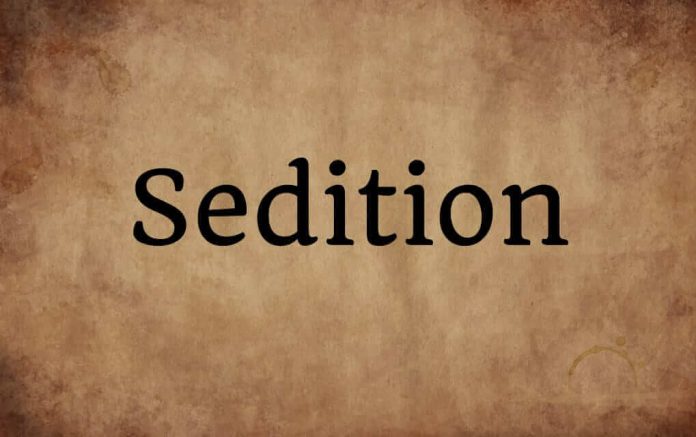This article is written by Diksha Ranjan pursuing Diploma in Advanced Contract Drafting, Negotiation and Dispute Resolution.
This article has been published by Sneha Mahawar.
“The use of sedition is like giving a saw to the carpenter to cut a piece of wood and he uses it to cut the entire forest itself”
–Former Chief Justice N.V Ramanna
Table of Contents
Introduction
Sedition means any form of speech, action or writing that provokes hatred towards the established government and harms the peaceful environment of the country. The issue with the sedition laws in India is that many consider it to be in conflict with freedom of speech and expression. There has been an abuse of sedition law in our country and according to the National Crime Records Bureau, there has been an increase in sedition cases since 2014. A non-deniable feature of democracy is the power of people to express their opinion on the laws and policies made by the established government, but sedition is often being used to suppress any kind of negative opinion and criticism against the established government. Therefore, criminalization under Section 124A of the Indian Penal Code, 1860 (hereinafter IPC, 1860) is not just in a democratic society and this law has been questioned by the Supreme Court itself. Recently, there has been an increase in cases of sedition to suppress criticism and protests against certain government policies and projects and to criminalise any dissenting opinions from human rights activists, lawyers and journalists. This indicates that there has been an abuse of sedition laws by the government by filing frivolous and vexatious lawsuits, against the legitimate critique of the government’s policies. Retired Supreme Court Justice Nariman has opined that one of the most obscure of all offences known to the criminal law is the offence of sedition, and has urged the Supreme Court to strike down sedition law.
Statutory provisions related to sedition in India
Section 124A was incorporated in IPC, 1860 in the year 1870 by the colonial British government to suppress the sentiments of Indian nationalists and freedom fighters. According to Section 124A of IPC, a person is said to commit the offence of sedition if he induces or attempts to induce hostility or contempt or arouses or attempts to arouse animosity in the public through spoken or written words or by signs or through any other visual depiction. This resentment must be brought against the interest of the government established by law in India. Therefore, the two essentials of sedition under IPC, 1860 are as follows:
1. Inducing or attempting to induce hostility or contempt or arousing or attempting to arouse animosity towards the government of India.
2. Such acts or attempts may be done:-
a. through spoken or written words,
b. through signs,
c. through visible representations.
The offence of sedition is punishable with life imprisonment or with imprisonment extending up to three years, additionally fine may be attached in both circumstances.
In 1973, Section 124A of IPC, 1860 was declared as a cognizable offence in the Criminal Procedure Code by the Indira Gandhi Government. Therefore, since the offence was made cognizable, Police Officers had the authority to conduct arrests without a warrant.
Apart from Section 124A, other laws that cover sedition in India are as follows:
- The Code of Criminal Procedure Code, 1973: Section 95 of the Code of Criminal Procedure, 1973 gives the authority to the State Government to forfeit any printed article, newspaper, book, publication or any document. In order to forfeit or seize such printed articles, newspapers, books, publications or documents, it must, in the opinion of the State Government, contain any matter which is punishable under Section 124A of the IPC, 1860.
- The Unlawful Activities (Prevention) Act, 1967: Section 2(o) of the Unlawful Activities (Prevention) Act, 1967 defines what amounts to “unlawful activity”. It states that any action taken by an individual or an association either through spoken or written words, signs, or visible representations, which induces hostility or hatred and questions the sovereignty or territorial integrity of India will amount to “unlawful activity” within the territory of India. According to Section 2(o)(iii) of the Act, if a feeling of disaffection is caused or induced against India, by words, signs, and visible representation then it amounts to “unlawful activity” which also is the crux of Section 124A of IPC, 1860.
- The Prevention of Seditious Meetings Act, 1911: This Act gives the authority to the State Government to declare certain areas as proclaimed areas, and no such public meeting, distribution of any printed material, any discussion, which is likely to cause disturbance or peace or inducing the public, shall be held in any proclaimed area. To conduct any such public meeting in a proclaimed area, written permission from either the District Magistrate or the Commissioner of Police is required. The permission to conduct public meetings can also be denied by the authority on grounds that such a meeting is likely to promote hatred, and disaffection or will result in a disturbance of public peace.
Arguments in favour of and against sedition law
The proponents of sedition as a crime argue that the law keeps a check on anti-national and terrorist elements that can hamper public order, and security of the state and can incite violence in the nation. It has also been argued that sedition law helps in maintaining the stability of the established government, which would otherwise be attempted to be overthrown by illegal and violent means. With existing sedition laws, contempt of the elected government can be checked.
However, the constitutionality of Section 124A of the IPC, 1860 is now being strongly questioned. If anyone holds a view that is different from the view which is acceptable to the government, they are immediately termed as ‘anti-national’ or ‘desh-drohi’. Sedition is now seen as a draconian law which is often used against what is otherwise constitutionally guaranteed freedom of speech and expression. The Supreme Court has already given its opinion in the PIL filed against Faaroq Abdullah that “views that are different from the government are not seditious”. There are different laws in India which can take care of unlawful activities; therefore there is no need for such an outdated law which does not fit in the present society. Further, countries like the UK and Australia have already repealed such a draconian law.
Even after several attempts made by the judiciary to restrict the meaning of sedition to an act of incitement of violence, there has been repetitive misuse of sedition law at the hands of the executive. The laws should change as society evolves. It is argued that the legislative intent to enact this law which existed at the time of its incorporation in IPC, 1860, does not exist anymore. Therefore, the laws that may be proper when they were enacted may not be appropriate in today’s situation.
There have been instances to show that sedition has been used as a device to stifle the voice of political rivals, censor free speech and silence any kind of dissent. To name a few, the protest emanating after the Citizenship Amendment Act, as many as 25 sedition cases were filed against people, who raised voices opposing it. Also, 22 of such instances were witnessed after the Hathras gang rape case and 27 sedition cases after the Pulwama mishap. However, the conviction rates in these cases are very low. Moreover, this indicates that the State authorities and police are using the law whimsically to instil fear in the people and silence any criticism against the administration.
Key judicial pronouncements on sedition
Historically, the sedition law has been used to eliminate politically different opinions. The first instance of a case being filed for sedition was against Jogendra Chunder Bose in 1891. Sedition was used by the British Government to silence any negative view and criticism against them and as a result, several freedom fighters like Mahatma Gandhi, Bal Gangadhar Tilak, and many others were sent to prison on sedition charges during the freedom movement.
After Independence, there has been an abuse of sedition by both the Centre and the State Governments to keep in check all kinds of critics and opponents. The legitimacy of sedition law has been questioned by the Courts on multiple occasions. So, the issue regarding the legality of the statute was finally settled by the Supreme Court in Kedar Nath Singh V. State of Bihar (1962). The facts of the case are as follows:
- In this case, the appellant criticised the ruling National Party, Congress, for its capitalist policies in a speech, for which he was convicted for the charges of sedition.
- The appellant’s appeal was struck down by the High Court of Patna, therefore, he moved the appeal before the Honourable Supreme Court. The appellant’s contentions were that Section 124A of the IPC, 1860 was violative of freedom of speech and expression under Article 19(1)(a) of the Constitution.
- The Supreme determined the major issue in this case, which was whether the restrictions imposed under Section 124A of the IPC, 1860 fall within the category of reasonable restriction under Article 19(2) of the Constitution. If the restrictions fall within the ambit of Article 19(2), it is then constitutionally valid.
- The Supreme Court finally gave the rest to the issue by determining the validity of Section 124A of the IPC, 1860. The Supreme Court upheld the constitutional validity of Section 124A of the IPC, 1860 on the ground that restriction of speech in the interest of protecting public peace and public order is a reasonable restriction under Article 19(2) of the Constitution.
However, it is noteworthy that the language of Section 124A states that “bring into hatred or contempt” or “attempt to excite disaffection”, which can be variously interpreted and due to lack of clarity as to what exactly amounts to sedition, police and authorities find it easy to implicate people. The following mentioned recent cases will give a better understanding of sedition law in our country, as it stands today:
- In May, 2021 a writ petition was filed before the Supreme Court of India under Article 32 by two Telugu news channels TV5 and ABN. In this case, M/S Aamoda Broadcasting Company Private Limited Vs The State of Andhra Pradesh, the petitioners were aggrieved by the FIR registered against them on a charge of sedition. The main contentions of the petitioners were that the FIR lodged against them was an assault on the freedom of speech and expression under Article 19(1)(a) of the Constitution. The Apex Court restrained the Andhra Pradesh Government from taking adverse action against two Telugu news channels and remarked that not everything can be seditious, and also stated that we should have clarity regarding sedition laws in our country.
- In Rajat Sharma Vs Union of India(2021) a PIL was filed against former Chief Minister of Jammu and Kashmir, Mr. Farooq Abdullah on the grounds of violation of Section 124A of IPC, 1860. Mr. Faarooq Abdullah, in an interview, opined on the restoration of Article 370 with the help of China’s support. The Bench of Justice Hemant Gupta and Justice Sanjay Kishan Kaul stated that every view that differs from the government does not come within the ambit of sedition. The Bench also imposed a cost of Rs. 50,000 on the petitioner claiming that this PIL was filed just for the purpose of publicity.
- In Disha A. Ravi Vs State (NCT of Delhi) (2021), after the aftermath of the Greta Thunberg Toolkit debacle, a case was filed against 22-year-old Disha Ravi, for tweeting in support of farmers’ agitation in India. The accused was arrested on the grounds that the accused was a part of the Khalistani conspiracy against India. In this case, the Delhi High Court expressed that citizens cannot be put behind bars simply because they disagree with the state policies and the accused was released on bail subject to certain conditions.
The Supreme Court puts sedition under abeyance : S.G. Vombatkere v. Union of India
The constitutional validity of Section 124A of the IPC, 1860 was challenged by some public-spirited individuals in the case S.G. Vombatkere V. Union of India before the Honourable Supreme Court of India. In this case, the Supreme Court considered the security and integrity of the State on one hand and the civil liberties on the other hand, and the Supreme Court opined that both are required to be balanced. It seemed difficult to balance both due to the outdated sedition law, which is being misused. Therefore, the order of 11th May, 2022 passed by the Supreme Court by a bench headed by former Chief Justice of India N.V. Ramanna, stayed the use of the 152-year-old sedition law. In a historic and pragmatic ruling, the Supreme Court directed the Centre and States not to register any new FIR under sedition charges i.e. under Section 124A of IPC, 1860, until the law is reviewed. The Supreme Court ordered that Section 124A of IPC, 1860 should be effectively kept in abeyance till the Union Government reconsiders the provision.
The Supreme Court has clearly given a message by this interim order that civil liberties are to be balanced with the security of the state. The order of the Supreme Court got widely praised and is viewed as an act of judicial statesmanship. Since the inception of the sedition law, it is the first time that this law is suspended. Recent abuse of sedition law stresses the need for a relook on this law and by passing such an order, people’s faith in the judiciary is restored.
Conclusion
The jurisprudential essence of sedition has been one of the most controversial topics as it unreasonably restricts constitutionally guaranteed freedom of speech and expression. It is high time that sedition law needed reconsideration, because such a law is a bane for democracy, as it does not fit well in post-colonial, independent India.
The Supreme Court’s decision on sedition got wide acclamation, but it is still incomplete as it needs to be reconsidered by the Union Government and a permanent solution is yet to be provided for the abuse of sedition. The classification of the offence of sedition as cognizable and non-bailable also needs to be considered. Therefore, strict guidelines need to be issued with regard to sedition law in order to safeguard the freedom of speech and expression in a democratic country like India.
References
- https://www.thehindu.com/news/national/is-this-law-necessary-sc-seeks-centres-response-on-pleas-challening-sedition-law/article35336402.ece
- https://ncrb.gov.in/en/crime-in-india-table-addtional-table-and-chapter-contents?field_date_value%5Bvalue%5D%5Byear%5D=&field_select_table_title_of_crim_value=23&items_per_page=50
- https://www.livelaw.in/top-stories/strike-down-sedition-law-offending-provisions-of-uapa-justice-nariman-urges-supreme-court-183534?infinitescroll=1
- https://main.sci.gov.in/judgment/judis/4007.pdf
- https://indiankanoon.org/doc/97881817/
- https://www.livelaw.in/pdf_upload/rajat-sharma-vs-union-of-india-ll-2021-sc-129-390034.pdf
- https://indiankanoon.org/doc/134384639/#:~:text=S.G.,India%20on%2011%20May%2C%202022&text=1.,to%20the%20offence%20of%20Sedition
- https://www.livemint.com/news/india/views-different-from-government-s-opinion-not-seditious-supreme-court-11614754378845.html
- https://www.iasgyan.in/ig-uploads/pdf/ias_gazette_june_2022_online_version.pdf
Students of Lawsikho courses regularly produce writing assignments and work on practical exercises as a part of their coursework and develop themselves in real-life practical skills.
LawSikho has created a telegram group for exchanging legal knowledge, referrals, and various opportunities. You can click on this link and join:
Follow us on Instagram and subscribe to our YouTube channel for more amazing legal content.
 Serato DJ Crack 2025Serato DJ PRO Crack
Serato DJ Crack 2025Serato DJ PRO Crack











 Allow notifications
Allow notifications


